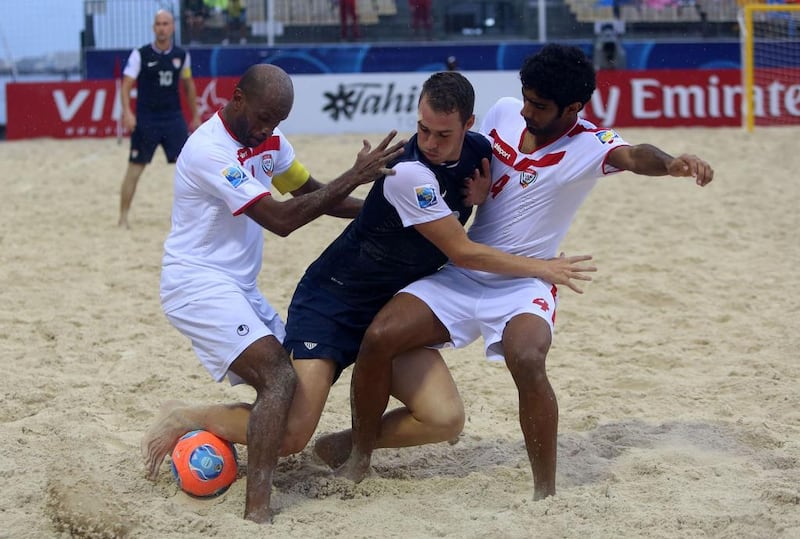In the end, the only Arab country present at the 2013 Beach Soccer World Cup in Tahiti failed to progress from the group stage. Three matches, three losses and a long flight home.
In the build-up to the tournament, Marcelo Mendes, the UAE coach, deliberately played down expectations; reaching the knockout stages for the first time in the country’s history would be a major achievement, he said. Despite pockets of excellent football, the UAE fell short of that target.
First the bad news.
Everything was in place for a successful tournament. Pre-tournament preparations mostly went smoothly, with success in several international competitions.
Even the loss of first-choice goalkeeper Humaid Jamal to a toe injury on the eve of the tournament did not have a major bearing on the UAE’s performances; his replacement, Mohamed Al Jasmi, was the standout performer for the team in Tahiti, with a host of stunning saves and even one spectacular goal.
Those positioned in front of him had problems. Nerves in the opening fixture against the home nation, defensive lapses after energy-sapping comebacks, and above all, a lack of firepower in the closing stages all contributed to the three defeats.
The tournament petered out for the UAE. The 6-4 loss to the winless USA in the teams' Group A finale was moot and anticlimactic, with only a few fans turning up. If that was not enough, it rained, too.
Now for the good news.
In all three matches, particularly during the second periods, the UAE gave as good as they got against their opponents and could realistically have gone on to win all of them. Progress from Group A was not unfeasible, and the team’s disappointment at the end showed that the players were not happy just to make up the numbers. A genuine opportunity had been missed.
In the UAE, beach soccer is increasingly being taken seriously as part of the wider football landscape. While it certainly does not have the exposure, or kudos, of its grass-based parent, it is no novelty sport, either.
It has come a long way from the days when it was, for all intents and purposes, a senior tour for former professional footballers.
Fifa-sanctioned competitions now take place year-round, and no longer only in locations associated with beaches or warm weather. Over the last year, the UAE has held the Samsung Beach Soccer Intercontinental Cup in Dubai, finished third at the Belarus International tournament, lost to the host nation in the final of the Asian Beach Soccer Cup in China, and last month won the Hungary Beach Soccer Cup after beating the hosts in the final.
Meanwhile, Emirati players are in demand from foreign clubs. Jamal won the Mundialito De Clubs with Russian side Lokomotiv Moscow in Rio de Janeiro last year, while top scorer Ali Karim represented the United States’ Seattle Sounders at the same tournament, and then played for Goldwin Plus, of Hungary, at the 2013 Euro Winners Cup in Italy.
The country’s top Arabian Gulf League clubs are lending their weight to the development of beach soccer. Al Ahli, Al Wasl, Al Nasr, Al Shabab, Ajman and Kalba were all represented in the UAE’s 12-man squad in Tahiti.
It is likely that beach soccer in the Emirates will remain very much in the shadows of the first-class code. Mahdi Ali’s seniors are the finest UAE team of the last two decades, and next month the nation will be hosting the 2013 Fifa Under 17 World Cup.
It is tough to stand out among such competition, but Mendes and his men will continue their efforts to put the UAE on the beach soccer map. They may not get the acclaim that Mahdi Ali, Omar Abdulrahman and company get, but they are doing their bit for Emirati football all the same.
akhaled@thenational.ae





